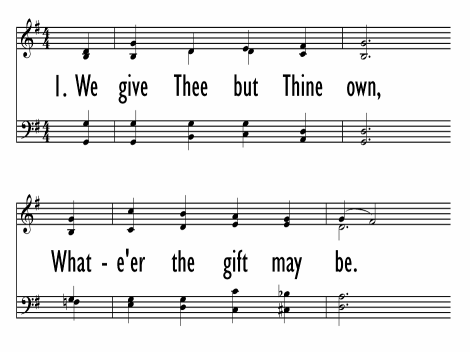“We Give You But Your Own” is a hymn about stewardship, about bringing our gifts to be used for the church's ministry of word and deed to needy people–in other Words, our ministry for Christ. Like Psalm 50 and Isaiah 1, this text declares that everything in creation already belongs to God and that what we give and what we keep are all to be used gratefully in God's service (st. 5). See also 294.
Scripture References:
st. 1 = 1 Chron, 29:14, 1 Peter 4:10
st. 2 = Deut. 26:1-5
st. 3-4 = Matt. 25:35-40
When he wrote this hymn, Bishop William W. How (PHH 279) appended a reference to Proverbs 19:17: "Whoever has pity on the poor lends to the Lord"–a Scripture that characterizes not only this hymn text but also much of How's ministry to the poor in the east side of London, England.
“We Give You But Your Own” is a hymn about stewardship, about bringing our gifts to be used for the church's ministry of word and deed to needy people–in other Words, our ministry for Christ. Like Psalm 50 and Isaiah 1, this text declares that everything in creation already belongs to God and that what we give and what we keep are all to be used gratefully in God's service (st. 5). See also 294.
How wrote the text in six stanzas in 1858; it was first published in Psalms and Hymns (2nd ed., 1864), edited by How and Thomas B. Morrell. The Psalter Hymnal omits How's original stanza 3 and includes many alterations to the text.
Liturgical Use:
As an offertory hymn (st. 1 and 2 also make a fine choral response at the offertory, but do not overuse); as a post-sermon hymn in conjunction with stewardship themes.
--Psalter Hymnal Handbook
===================
We give thee but Thine own. Bishop W. W. How. [Offertory.] Written about 1858, and first published in the enlarged edition of Morrell & How’s Psalms & Hymns, 1864, No. 197, in 6 stanzas of 4 lines. From thence it has passed into numerous collections, and now ranks in popularity with some of the best of modern hymns. Of the author's compositions in extensiveness of use it is exceeded only by his "For all Thy Saints who from their labours rest." Original text, Church Hymns 1871. The doxology in Hymns Ancient & Modern and others is an addition.
--John Julian, Dictionary of Hymnology (1907)
Hymnary Pro Subscribers
Access
an additional article
on the Canterbury Dictionary of Hymnology:
Hymnary Pro subscribers have full access to the Canterbury Dictionary of Hymnology.
Subscribe now


 My Starred Hymns
My Starred Hymns






